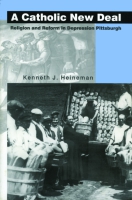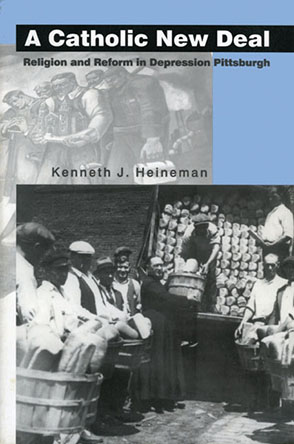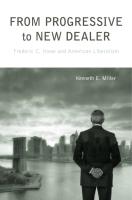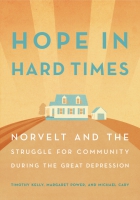A Catholic New Deal
Religion and Reform in Depression Pittsburgh
Kenneth J. Heineman
“In this lively and informative account of 1930s Pittsburgh, the smoky center of the American iron and steel industry, Heineman shows that much of the effective union building, and many social reforms, were achieved by Catholic clergy and laity, inspired by papal teachings on social justice. Heineman has a confident, lucid style and guides the reader through the labyrinthine politics of the period, showing the connections between local, national and international issues as the Second World War approached. In his sure hands, the New Deal era takes on a surprisingly different appearance, more imbued with religious activism than previous historians have supposed.”
- Media
- Description
- Reviews
- Bio
- Subjects
2000 Pennsylvania Historical Association's Phillip S. Klein Book Prize
Despite the fact that Catholics were the core of the American industrial working class in the 1930s, historians (and many contemporary observers) have underestimated or ignored the religious component of labor activism in this era. In fact, many labor historians have argued that workers could not have formed successful industrial unions without first severing their religious ties. Heineman disputes this, arguing that there would have been no steelworkers union without Pittsburgh Catholics such as James Cox, Patrick Fagan, Carl Hensler, Phil Murray, and Charles Owen Rice. He presents a complex portrait of American Catholicism in which a large number of activist priests and laity championed a distinctly Catholic vision of social justice. This vision was anti-Communist, anti-Fascist, and anti-laissez faire. These Catholics, in turn, helped to make the Democratic Party and the CIO powerful organizations. A Catholic New Deal shows conclusively the important role that religion played in the history of organized labor in America.
“In this lively and informative account of 1930s Pittsburgh, the smoky center of the American iron and steel industry, Heineman shows that much of the effective union building, and many social reforms, were achieved by Catholic clergy and laity, inspired by papal teachings on social justice. Heineman has a confident, lucid style and guides the reader through the labyrinthine politics of the period, showing the connections between local, national and international issues as the Second World War approached. In his sure hands, the New Deal era takes on a surprisingly different appearance, more imbued with religious activism than previous historians have supposed.”
“Kenneth Heineman has written an important study that should foster serious rethinking of the role of religion and regional variation in our understanding of the Great Depression.”
“In this richly detailed study of those leaders of Catholic, ethnic, working-class Pittsburgh, Heineman contributes solidly to the expanding evidence of the centrality of Catholic reformers in the emergence of the New Deal and American welfare.”
“The author’s research is thorough, his judgments are sound, and his prose is lucid. This is a major addition to the New Deal, trade unionism, and cultural studies, and a valuable corrective to the labor movement that will be welcomed by both labor and church historians.”
“Heineman has provided nuance to understanding a historical period that will always command our our attention.”
“Intended to ‘bridge the gap’ between academia and the general reading public, this generally welcome addition to our understanding should find ready acceptance in both audiences.”
“In this impressive new study, Kenneth J. Heineman reports on what the church did in Pittsburgh, a city dominated by big steel and ethnic Catholicism. . . . Heineman has written an excellent study of labor activism and a tonic for those who would argue that the church repressed the labor movement in the twentieth century.”
“A Catholic New Deal is a scholarly work about the religious roots of the labor movement. It explains how Catholics helped make the Democratic Party and CIO powerful organizations.”
“An eye-opening and compelling narrative of the role of ethnic Pittsburgh Catholics in building and sustaining a reform-minded Democratic party and a militant union movement during the depression. His work more then amply shows how Catholic ideas, leaders, and workers contributed to reform politics and unionization during the thirties.
This path-breaking book deserves a serious reading by anyone attempting to understand American Catholicism, ethnic history, reform politics, or the successful unionization of heavy industry during the 1930s.”
“To satisfy this need, he has written A Catholic New Deal, an eye-opening and and compelling narrative of the role of ethnic Pittsburgh Catholics in building and sustaining a reform-minded Democratic party and a militant union movement during the Depression. His work more than amply shows how Catholic ideas, leaders, and workers contributed to reform politics and unionization during the thirties.
This path-breaking book deserves a serious reading by anyone attempting to understand American Catholicism, ethnic history, reform politics, or the successful University of St. Thomas.”
Kenneth J. Heineman is Associate Professor of History at Ohio University and the author of Campus Wars: The Peace Movement at American State Universities in the Vietnam Era (1993) and God Is a Conservative: Religion, Politics, and Morality in Contemporary America (1998).
Also of Interest
Mailing List
Subscribe to our mailing list and be notified about new titles, journals and catalogs.






